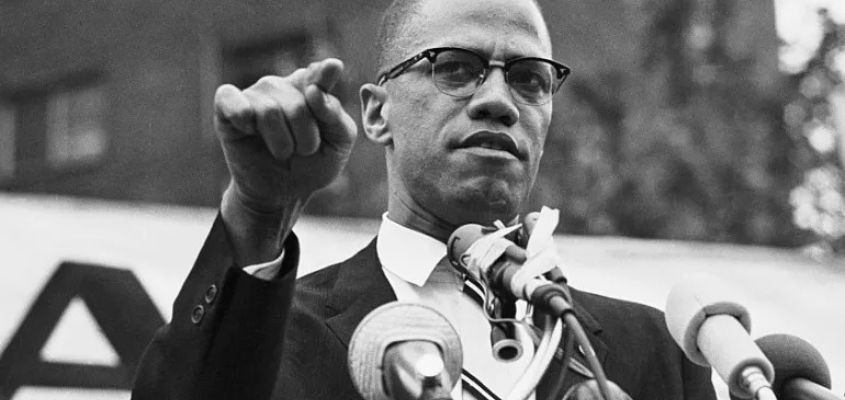
Every year, people around the world honor Malcolm X. Though he was taken from us prematurely, his memory and impact remain. With that memory, there is a mandate that we accept and carry on the legacy of his politics and the others who are the heart of the Black Radical Tradition.
“The price to make others respect your human rights is death. You have to be ready to die… it’s time for you and me now to let the world know how peaceful we are, how well-meaning we are, how law-abiding we wish to be. But at the same time, we have to let the same world know we’ll blow their world sky-high if we’re not respected and recognized and treated the same as other human beings are treated.” (El-Hajj Malik El-Shabazz, Malcolm X)
“…to be committed to justice we must believe that ethics matter, that it is vital to have a system of shared morality.” (Bell Hooks)
On a cold New York afternoon in Harlem February 21, 1965, “Don’t Do it,” were the last words that the world heard from the voice of El Hajj Malik El-Shabazz, better known as Malcolm X, before the assassins opened fire with a barrage of bullets that would take Malcolm away from us physically.
So we come every year to commemorate February 21, the day Malcolm was added to the long list of the great African anti-colonial fighters our struggle produced in the ongoing battle against the slavers and colonizers that spilled out of Europe in 1492 to stain human history with their unprecedented savagery.
“When Cristoforo Colombo, better known as Christopher Columbus, the original genocidal gangster, “discovered” a route for a sea bridge between the kingdom of Spain and what became the “Americas,” it ushered in a new historical epoch that would see levels of human degradation, violence and depravity unlike any other era of the human experience on this planet. At the center of the cosmology of these strange people from Spain, and later from other parts of what became Europe, was an ideal of human difference, at first informed by religion but very soon intersected with a process of racialization that hierarchized race with so-called whites and white civilization at the top. That racial hierarchy, rationalized by some of Europe’s greatest philosophers from Locke and Immanuel Kant to Hegel, called into question or even excluded the non-European “others” as full human beings.
From the settlers who shot and killed their way across the lands that were incorporated into the colonial United States, to the brutality, rape and terror of plantation slavery, to the lynching and burning of Black communities, the denial of the value of Black life and indeed all non-European life, has been an enduring feature of the Pan-European colonial and settler-colonial project.”
Out of the madness that produced genocide and slavery in the territory named the United States, to the brutal genocide in Gaza today, the enslaved, the colonized, the oppressed in all forms, have resisted, but in their resistance they also envisioned a world where life, human dignity, and peace existed beyond the imposed barbarity from the white West.
Malcolm’s voice and the movement that produced him and others, like John Horse, Martin Luther King, Fannie Lou Hamer, Safiya Bakhari, the Revolutionary Action Movement, Black Panthers and Black Liberation Army, became integral to the worldwide anti-colonial movement that intensified after 1945. It is this revolutionary tradition , reflected in Malcolm’s political life and philosophy, that connected three streams of the Black Radical Tradition: nationalism, anti-colonialism and internationalism, that we uphold on February 21st.
Through the example of Malcolm’s life and sacrifice, we recommit ourselves to the historic task and responsibility that history has assigned us – defeat the enemies and the system that murdered Malcolm and continue to degrade and dehumanize peoples and nations across the planet.
People around the world loved Malcolm. They loved him because they knew instinctively that he loved them, that he stood with them against a common enemy, and that he was, in the words of James Baldwin, “the spiritual property of the people.” This spirit of connectedness, internationalism, and resistance represents the core elements of the Black radical tradition that brought our movement into the mainstream of the global anti-colonial, anti-capitalist and pro-socialist, people(s)-centered human rights struggle.
So, they may have taken Malcolm from us physically, but El-Hajj Malik El-Shabazz is in our hearts and will be with us on that day when we finally are able to end the over five hundred years of human degradation called European modernity.
Ajamu Baraka is the Chairman of the Coordinating Committee of the Black Alliance for Peace and an editor and contributing columnist for the Black Agenda Report. Baraka serves on the Executive Committee of the U.S. Peace Council and leadership body of the U.S.-based United National Anti-War Coalition (UNAC) and the Steering Committee of the Black is Back Coalition.
source: Black Agenda Report